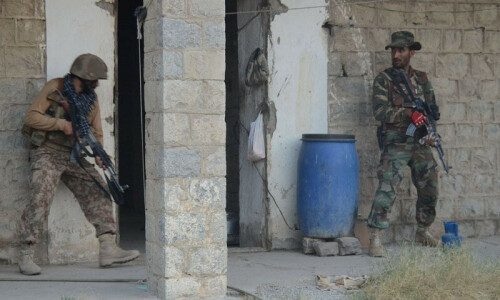ISLAMABAD: The government on Wednesday continued its spending extravaganza towards parliamentarians’ schemes and approved an additional Rs23.8 billion in supplementary grants for the so-called Sustainable Development Goals Achievement Programme (SAP).
The Economic Coordination Committee (ECC) of the Cabinet, chaired by Finance Minister Ishaq Dar, approved a total of nine supplementary grants, amounting to Rs29.3bn. Of them, an overwhelming number of five grants worth Rs23.78bn were approved for SAP.
The ECC had previously increased the allocations for such schemes to Rs111bn, almost 60pc higher than the budgetary allocations of Rs70bn for SAP schemes. With the fresh addition, the funds allocated for parliamentarians during the current fiscal year have become the second-largest sector, at about Rs135bn, following the Rs168bn allocations for the transport and communication sector, including the National Highway Authority and Pakistan Railways.
An official said that the recent approval was only for Rs9bn, bringing the total SAP allocations to Rs120bn for the current fiscal year, while Rs14.8bn was out of the Rs20bn already surrendered by various ministries last month in favour of SAP’s account under the cabinet division. He, however, agreed that even with Rs120bn, the SAP for parliamentarians grabbed the second-largest chunk of funds after transport and communication. He added that sustaining a large coalition government, even without opposition challenges, is no easy task.
After latest approval, funds earmarked for lawmakers reach Rs135bn, second only to allocations for transport and communications
A statement issued by the ministry of finance after the ECC meeting quoted five such supplementary grants including three grants worth Rs17bn for ministry of housing and works (MOHW) during current fiscal year. These included Rs1bn to MOHW for development schemes in Punjab, another Rs14.8bn to MOHW for development schemes, Rs1.209bn to MOHW for execution of another 15 development schemes. Another Rs5bn grant was approved for Cabinet Division for SAP while another Rs1.773bn grant was given to Ministry of Energy (Power Division) for execution of development schemes of Punjab and KP.
On May 24, the ECC had also approved Rs20bn in favour of Cabinet Division for SAP. To secure these additional funds, five ministries were directed to surrender their funds, including Rs10bn from the Ministry of Communications, Rs5.66bn from Ministry of Railways, Rs3.43bn from Ministry of Climate Change and Environment and Rs861 million from the Planning Division.
The Cabinet Division, in its summary to the ECC, said the government had allocated Rs70bn in the budget 2022-23 for ‘running community based SAP’ to achieve the SDGs addressing the urban-rural social development constraints across the country. The funds for the scheme were increased by Rs17bn to Rs87bn in October last year to ensure that all 174 members of the National Assembly belonging to Pakistan Democratic Movement (PDM) get Rs500m worth of small schemes — sewage lines, gas, water and electricity connections, and repair and maintenance of streets — in the name of Sustainable Development Goals (SDGs).
Accordingly, the Ministry of Planning surrendered Rs17bn from funds previously allocated in the budget for areas such as Azad Jammu and Kashmir, Gilgit-Baltistan, and parts of the provinces. The funds were subsequently increased by an additional Rs3bn to Rs90bn, ‘which has already been released/transferred to the respective ministries, divisions and provincial governments under the demand No 92-IB-0600-Development Expenditure of the Cabinet Division,” the summary noted. Subsequently, the planning minister surrendered Rs1bn from a different head for poor districts for transfer to the SDG-AP schemes “in the larger public interest”.
Of the already disbursed funds of Rs91bn, the lion’s share of Rs46.125bn went to Punjab, followed by Rs29.155bn to Sindh and then Rs7.73bn and Rs6.99bn to KP and Balochistan, respectively.
The development schemes under the SAP, recommended by members, are cleared by a steering committee led by the planning minister — an arrangement put in place a few years ago to sidestep a Supreme Court judgement. The PTI government had earlier started similar disbursements on political considerations for SAP after coming to power and allocated Rs64bn in its budget last fiscal year.
The ECC also approved a supplementary grant of Rs3.96bn in favour of Ministry of Federal Education and Professional Training under WB Project — Higher Education Development in Pakistan for 2022-23, besides two grants of Rs138m for Ministry of Narcotics Control and Rs6m for the Revenue Division to meet the shortfall of the budget grant of CFY 2022-23.
Published in Dawn, June 8th, 2023














































Dear visitor, the comments section is undergoing an overhaul and will return soon.